Performance Appraisal: Importance, Issues, Analysis, and Conclusion
VerifiedAdded on 2023/03/31
|6
|1149
|66
Report
AI Summary
This report provides a comprehensive overview of performance appraisal in management. It defines performance appraisal as the process used by management to evaluate employee performance and contributions, highlighting its role in assessing skills, growth, and achievements, as well as identifying areas needing improvement. The report details the importance of performance appraisal, including recognizing and rewarding employees, clarifying objectives, and facilitating progression and development through training and support. It then explores the key assessment areas, such as trait, behavior, and result appraisals, and discusses the pros and cons of the appraisal system, including the OUCH test. The report concludes by acknowledging the challenges of performance appraisal while emphasizing its crucial role in aligning individual and organizational goals, ultimately guiding employees toward improved performance.
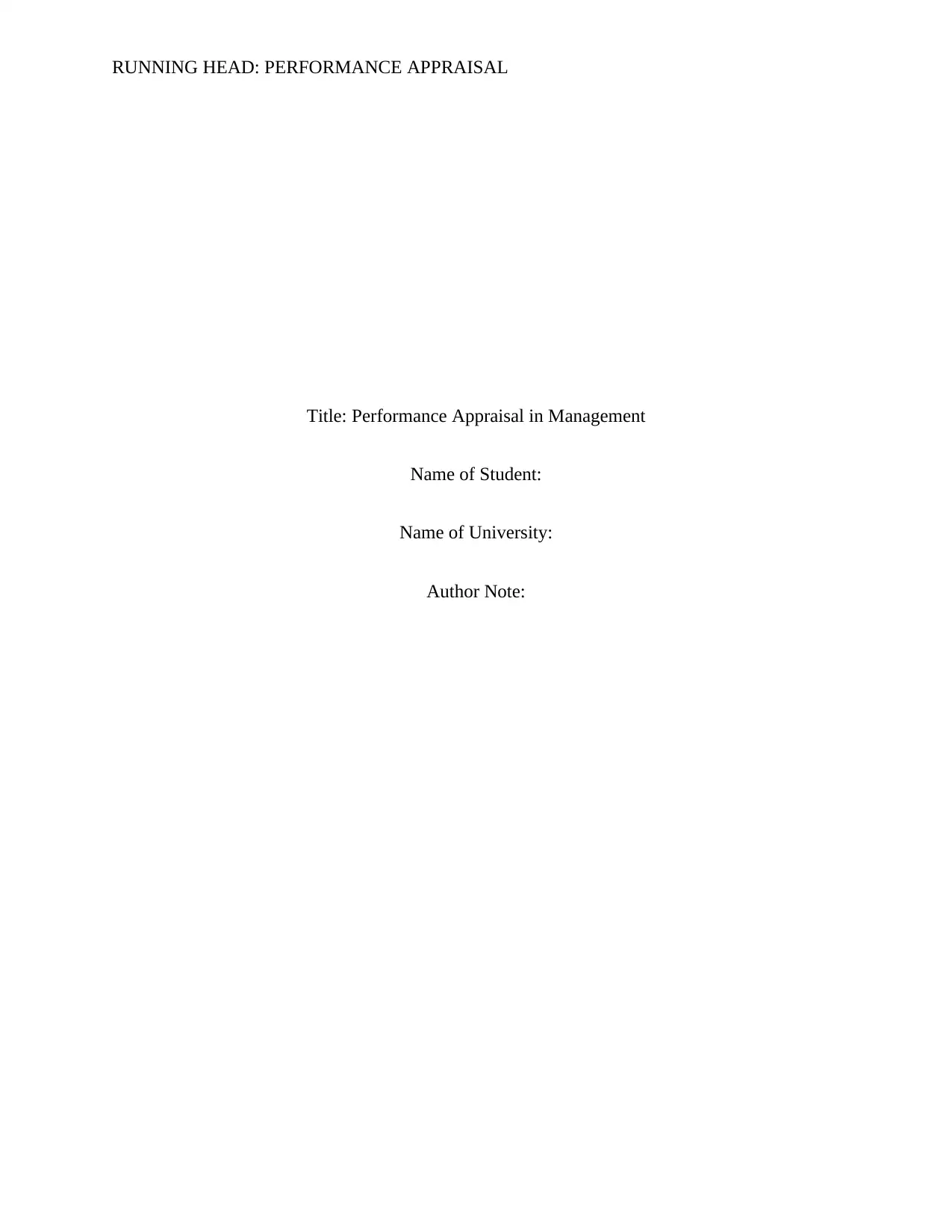
RUNNING HEAD: PERFORMANCE APPRAISAL
Title: Performance Appraisal in Management
Name of Student:
Name of University:
Author Note:
Title: Performance Appraisal in Management
Name of Student:
Name of University:
Author Note:
Paraphrase This Document
Need a fresh take? Get an instant paraphrase of this document with our AI Paraphraser
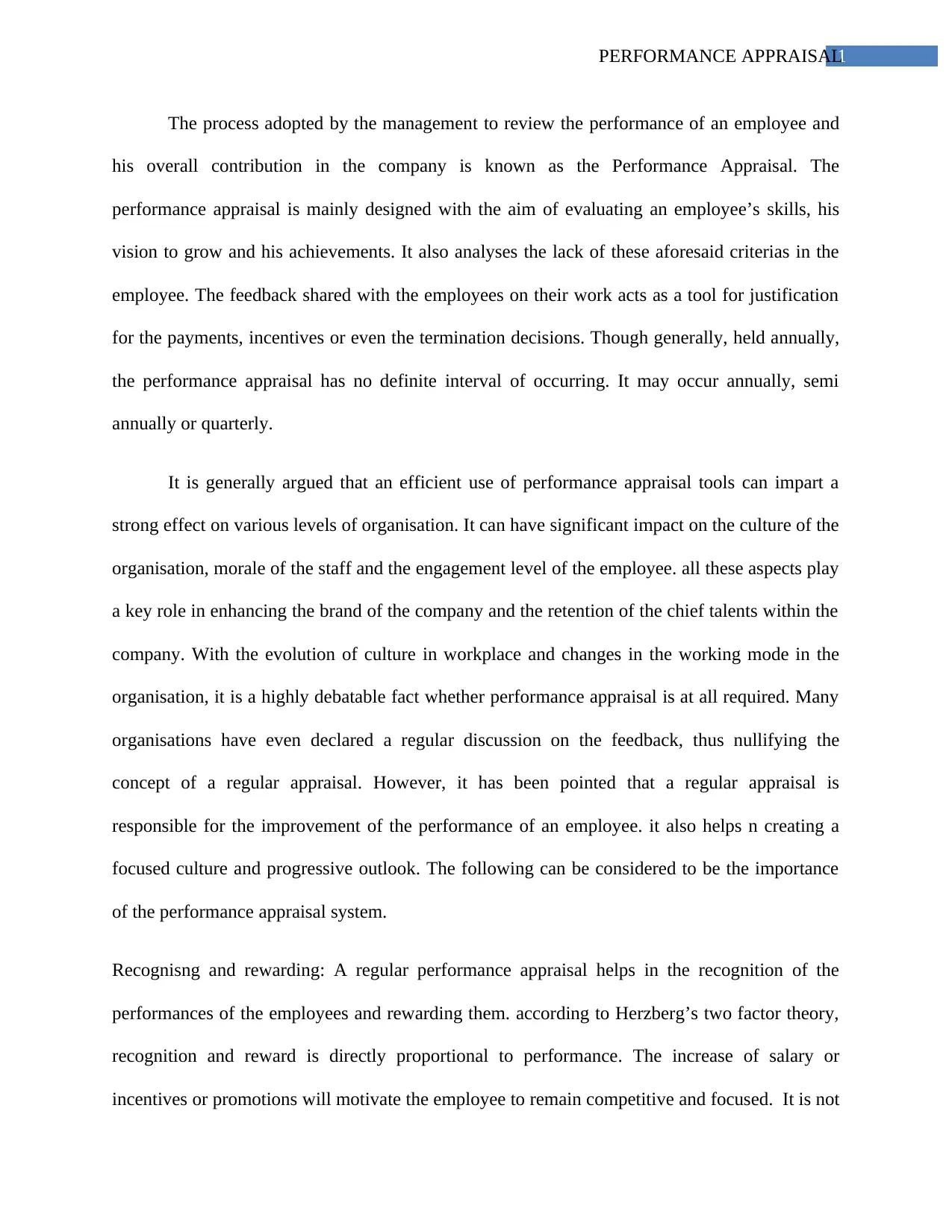
1PERFORMANCE APPRAISAL
The process adopted by the management to review the performance of an employee and
his overall contribution in the company is known as the Performance Appraisal. The
performance appraisal is mainly designed with the aim of evaluating an employee’s skills, his
vision to grow and his achievements. It also analyses the lack of these aforesaid criterias in the
employee. The feedback shared with the employees on their work acts as a tool for justification
for the payments, incentives or even the termination decisions. Though generally, held annually,
the performance appraisal has no definite interval of occurring. It may occur annually, semi
annually or quarterly.
It is generally argued that an efficient use of performance appraisal tools can impart a
strong effect on various levels of organisation. It can have significant impact on the culture of the
organisation, morale of the staff and the engagement level of the employee. all these aspects play
a key role in enhancing the brand of the company and the retention of the chief talents within the
company. With the evolution of culture in workplace and changes in the working mode in the
organisation, it is a highly debatable fact whether performance appraisal is at all required. Many
organisations have even declared a regular discussion on the feedback, thus nullifying the
concept of a regular appraisal. However, it has been pointed that a regular appraisal is
responsible for the improvement of the performance of an employee. it also helps n creating a
focused culture and progressive outlook. The following can be considered to be the importance
of the performance appraisal system.
Recognisng and rewarding: A regular performance appraisal helps in the recognition of the
performances of the employees and rewarding them. according to Herzberg’s two factor theory,
recognition and reward is directly proportional to performance. The increase of salary or
incentives or promotions will motivate the employee to remain competitive and focused. It is not
The process adopted by the management to review the performance of an employee and
his overall contribution in the company is known as the Performance Appraisal. The
performance appraisal is mainly designed with the aim of evaluating an employee’s skills, his
vision to grow and his achievements. It also analyses the lack of these aforesaid criterias in the
employee. The feedback shared with the employees on their work acts as a tool for justification
for the payments, incentives or even the termination decisions. Though generally, held annually,
the performance appraisal has no definite interval of occurring. It may occur annually, semi
annually or quarterly.
It is generally argued that an efficient use of performance appraisal tools can impart a
strong effect on various levels of organisation. It can have significant impact on the culture of the
organisation, morale of the staff and the engagement level of the employee. all these aspects play
a key role in enhancing the brand of the company and the retention of the chief talents within the
company. With the evolution of culture in workplace and changes in the working mode in the
organisation, it is a highly debatable fact whether performance appraisal is at all required. Many
organisations have even declared a regular discussion on the feedback, thus nullifying the
concept of a regular appraisal. However, it has been pointed that a regular appraisal is
responsible for the improvement of the performance of an employee. it also helps n creating a
focused culture and progressive outlook. The following can be considered to be the importance
of the performance appraisal system.
Recognisng and rewarding: A regular performance appraisal helps in the recognition of the
performances of the employees and rewarding them. according to Herzberg’s two factor theory,
recognition and reward is directly proportional to performance. The increase of salary or
incentives or promotions will motivate the employee to remain competitive and focused. It is not
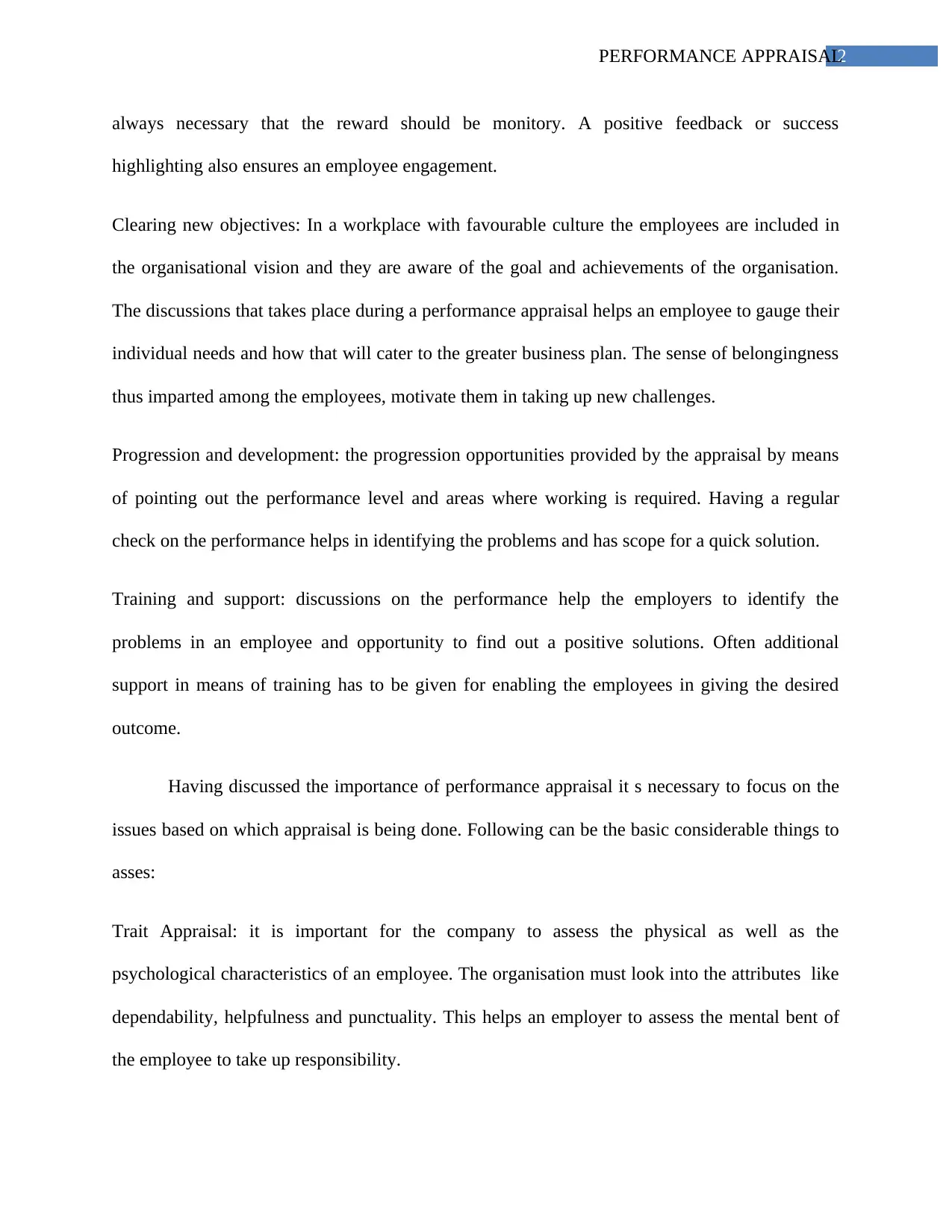
2PERFORMANCE APPRAISAL
always necessary that the reward should be monitory. A positive feedback or success
highlighting also ensures an employee engagement.
Clearing new objectives: In a workplace with favourable culture the employees are included in
the organisational vision and they are aware of the goal and achievements of the organisation.
The discussions that takes place during a performance appraisal helps an employee to gauge their
individual needs and how that will cater to the greater business plan. The sense of belongingness
thus imparted among the employees, motivate them in taking up new challenges.
Progression and development: the progression opportunities provided by the appraisal by means
of pointing out the performance level and areas where working is required. Having a regular
check on the performance helps in identifying the problems and has scope for a quick solution.
Training and support: discussions on the performance help the employers to identify the
problems in an employee and opportunity to find out a positive solutions. Often additional
support in means of training has to be given for enabling the employees in giving the desired
outcome.
Having discussed the importance of performance appraisal it s necessary to focus on the
issues based on which appraisal is being done. Following can be the basic considerable things to
asses:
Trait Appraisal: it is important for the company to assess the physical as well as the
psychological characteristics of an employee. The organisation must look into the attributes like
dependability, helpfulness and punctuality. This helps an employer to assess the mental bent of
the employee to take up responsibility.
always necessary that the reward should be monitory. A positive feedback or success
highlighting also ensures an employee engagement.
Clearing new objectives: In a workplace with favourable culture the employees are included in
the organisational vision and they are aware of the goal and achievements of the organisation.
The discussions that takes place during a performance appraisal helps an employee to gauge their
individual needs and how that will cater to the greater business plan. The sense of belongingness
thus imparted among the employees, motivate them in taking up new challenges.
Progression and development: the progression opportunities provided by the appraisal by means
of pointing out the performance level and areas where working is required. Having a regular
check on the performance helps in identifying the problems and has scope for a quick solution.
Training and support: discussions on the performance help the employers to identify the
problems in an employee and opportunity to find out a positive solutions. Often additional
support in means of training has to be given for enabling the employees in giving the desired
outcome.
Having discussed the importance of performance appraisal it s necessary to focus on the
issues based on which appraisal is being done. Following can be the basic considerable things to
asses:
Trait Appraisal: it is important for the company to assess the physical as well as the
psychological characteristics of an employee. The organisation must look into the attributes like
dependability, helpfulness and punctuality. This helps an employer to assess the mental bent of
the employee to take up responsibility.
⊘ This is a preview!⊘
Do you want full access?
Subscribe today to unlock all pages.

Trusted by 1+ million students worldwide
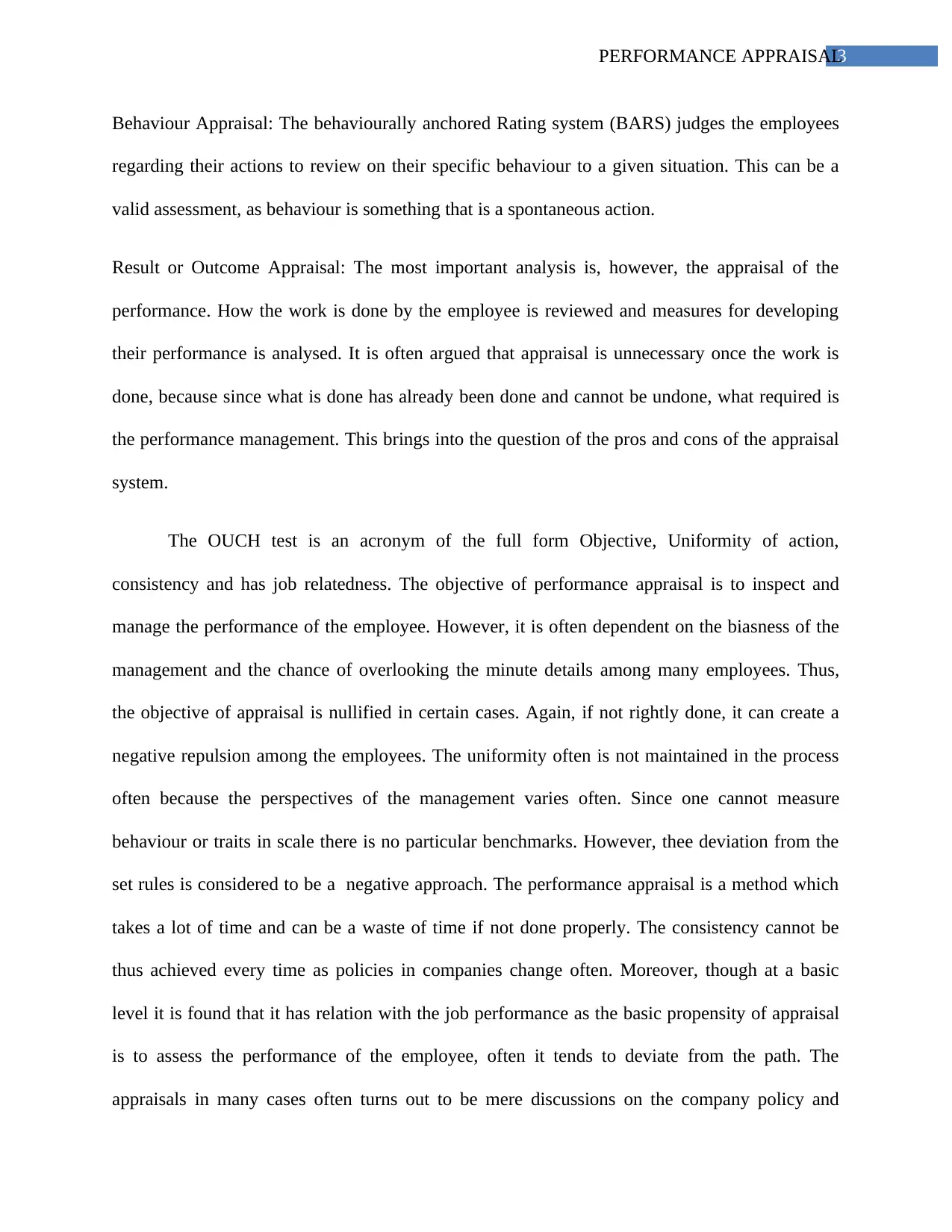
3PERFORMANCE APPRAISAL
Behaviour Appraisal: The behaviourally anchored Rating system (BARS) judges the employees
regarding their actions to review on their specific behaviour to a given situation. This can be a
valid assessment, as behaviour is something that is a spontaneous action.
Result or Outcome Appraisal: The most important analysis is, however, the appraisal of the
performance. How the work is done by the employee is reviewed and measures for developing
their performance is analysed. It is often argued that appraisal is unnecessary once the work is
done, because since what is done has already been done and cannot be undone, what required is
the performance management. This brings into the question of the pros and cons of the appraisal
system.
The OUCH test is an acronym of the full form Objective, Uniformity of action,
consistency and has job relatedness. The objective of performance appraisal is to inspect and
manage the performance of the employee. However, it is often dependent on the biasness of the
management and the chance of overlooking the minute details among many employees. Thus,
the objective of appraisal is nullified in certain cases. Again, if not rightly done, it can create a
negative repulsion among the employees. The uniformity often is not maintained in the process
often because the perspectives of the management varies often. Since one cannot measure
behaviour or traits in scale there is no particular benchmarks. However, thee deviation from the
set rules is considered to be a negative approach. The performance appraisal is a method which
takes a lot of time and can be a waste of time if not done properly. The consistency cannot be
thus achieved every time as policies in companies change often. Moreover, though at a basic
level it is found that it has relation with the job performance as the basic propensity of appraisal
is to assess the performance of the employee, often it tends to deviate from the path. The
appraisals in many cases often turns out to be mere discussions on the company policy and
Behaviour Appraisal: The behaviourally anchored Rating system (BARS) judges the employees
regarding their actions to review on their specific behaviour to a given situation. This can be a
valid assessment, as behaviour is something that is a spontaneous action.
Result or Outcome Appraisal: The most important analysis is, however, the appraisal of the
performance. How the work is done by the employee is reviewed and measures for developing
their performance is analysed. It is often argued that appraisal is unnecessary once the work is
done, because since what is done has already been done and cannot be undone, what required is
the performance management. This brings into the question of the pros and cons of the appraisal
system.
The OUCH test is an acronym of the full form Objective, Uniformity of action,
consistency and has job relatedness. The objective of performance appraisal is to inspect and
manage the performance of the employee. However, it is often dependent on the biasness of the
management and the chance of overlooking the minute details among many employees. Thus,
the objective of appraisal is nullified in certain cases. Again, if not rightly done, it can create a
negative repulsion among the employees. The uniformity often is not maintained in the process
often because the perspectives of the management varies often. Since one cannot measure
behaviour or traits in scale there is no particular benchmarks. However, thee deviation from the
set rules is considered to be a negative approach. The performance appraisal is a method which
takes a lot of time and can be a waste of time if not done properly. The consistency cannot be
thus achieved every time as policies in companies change often. Moreover, though at a basic
level it is found that it has relation with the job performance as the basic propensity of appraisal
is to assess the performance of the employee, often it tends to deviate from the path. The
appraisals in many cases often turns out to be mere discussions on the company policy and
Paraphrase This Document
Need a fresh take? Get an instant paraphrase of this document with our AI Paraphraser
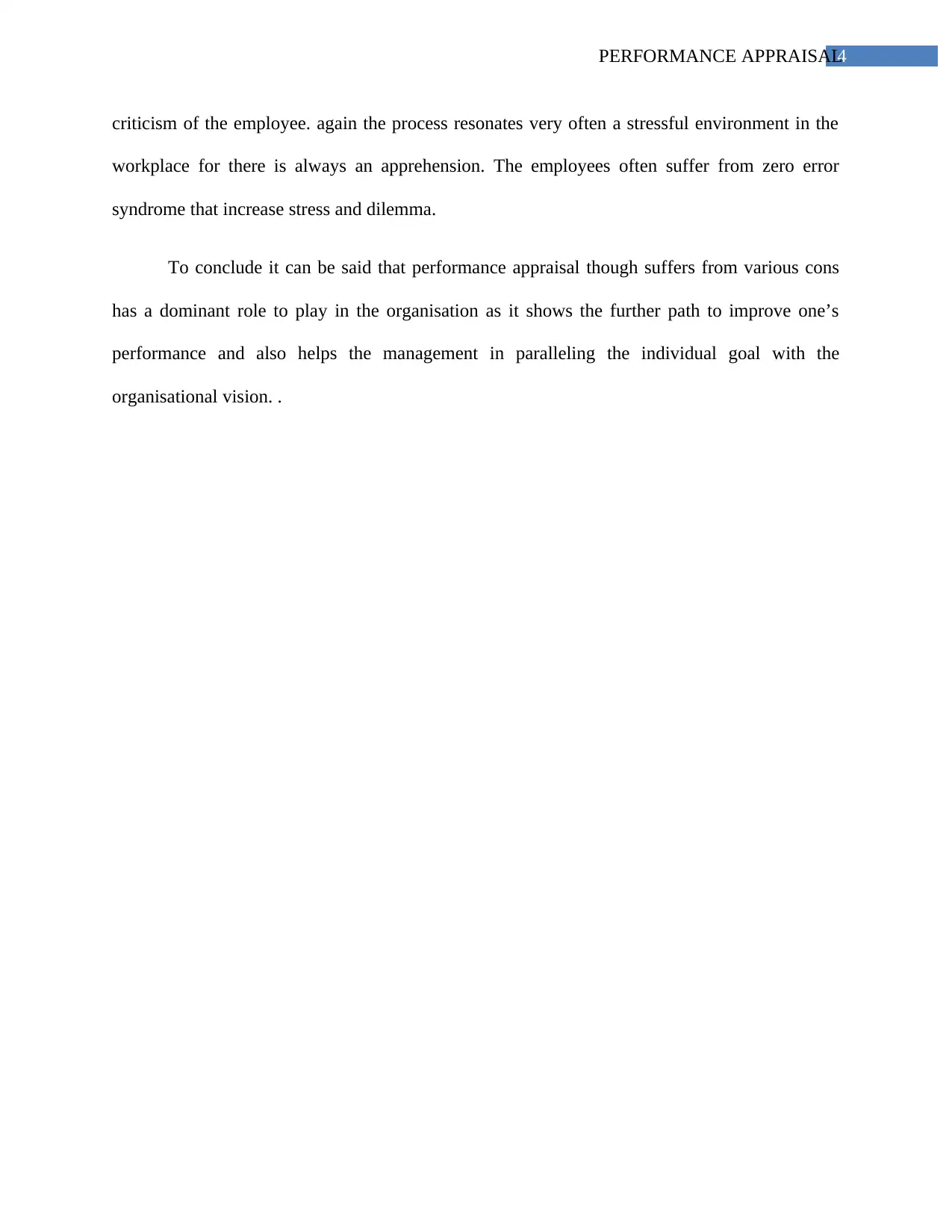
4PERFORMANCE APPRAISAL
criticism of the employee. again the process resonates very often a stressful environment in the
workplace for there is always an apprehension. The employees often suffer from zero error
syndrome that increase stress and dilemma.
To conclude it can be said that performance appraisal though suffers from various cons
has a dominant role to play in the organisation as it shows the further path to improve one’s
performance and also helps the management in paralleling the individual goal with the
organisational vision. .
criticism of the employee. again the process resonates very often a stressful environment in the
workplace for there is always an apprehension. The employees often suffer from zero error
syndrome that increase stress and dilemma.
To conclude it can be said that performance appraisal though suffers from various cons
has a dominant role to play in the organisation as it shows the further path to improve one’s
performance and also helps the management in paralleling the individual goal with the
organisational vision. .
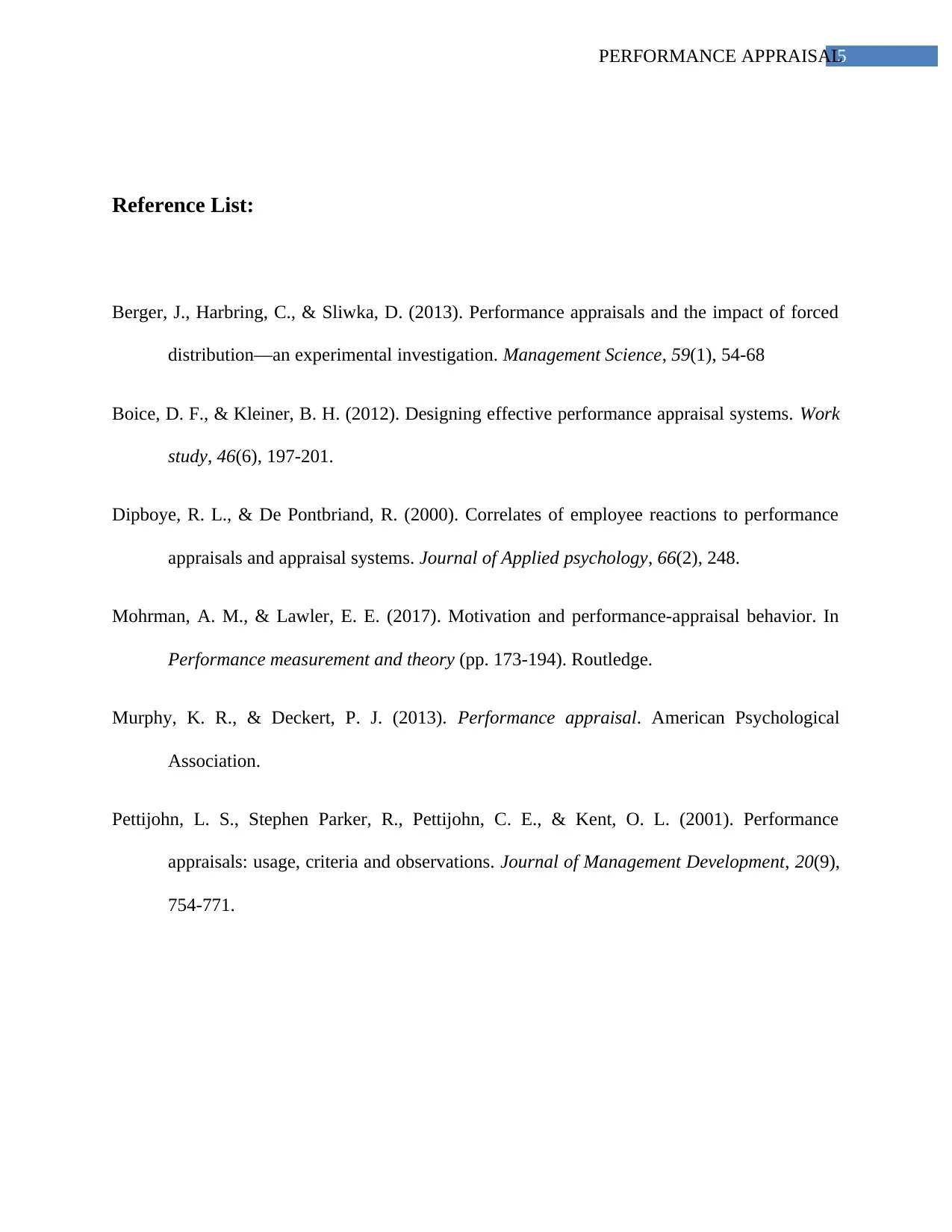
5PERFORMANCE APPRAISAL
Reference List:
Berger, J., Harbring, C., & Sliwka, D. (2013). Performance appraisals and the impact of forced
distribution—an experimental investigation. Management Science, 59(1), 54-68
Boice, D. F., & Kleiner, B. H. (2012). Designing effective performance appraisal systems. Work
study, 46(6), 197-201.
Dipboye, R. L., & De Pontbriand, R. (2000). Correlates of employee reactions to performance
appraisals and appraisal systems. Journal of Applied psychology, 66(2), 248.
Mohrman, A. M., & Lawler, E. E. (2017). Motivation and performance-appraisal behavior. In
Performance measurement and theory (pp. 173-194). Routledge.
Murphy, K. R., & Deckert, P. J. (2013). Performance appraisal. American Psychological
Association.
Pettijohn, L. S., Stephen Parker, R., Pettijohn, C. E., & Kent, O. L. (2001). Performance
appraisals: usage, criteria and observations. Journal of Management Development, 20(9),
754-771.
Reference List:
Berger, J., Harbring, C., & Sliwka, D. (2013). Performance appraisals and the impact of forced
distribution—an experimental investigation. Management Science, 59(1), 54-68
Boice, D. F., & Kleiner, B. H. (2012). Designing effective performance appraisal systems. Work
study, 46(6), 197-201.
Dipboye, R. L., & De Pontbriand, R. (2000). Correlates of employee reactions to performance
appraisals and appraisal systems. Journal of Applied psychology, 66(2), 248.
Mohrman, A. M., & Lawler, E. E. (2017). Motivation and performance-appraisal behavior. In
Performance measurement and theory (pp. 173-194). Routledge.
Murphy, K. R., & Deckert, P. J. (2013). Performance appraisal. American Psychological
Association.
Pettijohn, L. S., Stephen Parker, R., Pettijohn, C. E., & Kent, O. L. (2001). Performance
appraisals: usage, criteria and observations. Journal of Management Development, 20(9),
754-771.
⊘ This is a preview!⊘
Do you want full access?
Subscribe today to unlock all pages.

Trusted by 1+ million students worldwide
1 out of 6
Related Documents
Your All-in-One AI-Powered Toolkit for Academic Success.
+13062052269
info@desklib.com
Available 24*7 on WhatsApp / Email
![[object Object]](/_next/static/media/star-bottom.7253800d.svg)
Unlock your academic potential
Copyright © 2020–2026 A2Z Services. All Rights Reserved. Developed and managed by ZUCOL.





